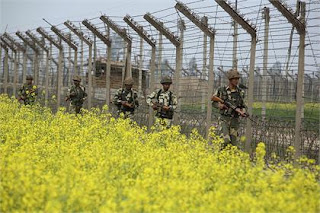 The Border Security Force (BSF) are not only fighting against human infiltrators across the Indo-Bangla border, but also against weeds and creepers infiltrating up the fences and obstructing view across the border.
The Border Security Force (BSF) are not only fighting against human infiltrators across the Indo-Bangla border, but also against weeds and creepers infiltrating up the fences and obstructing view across the border.
Although the International fence has acted as a tremendous force multiplier and saved much of the BSF’s work against infiltrators in several areas, the same fences have now posed a challenge with weeds and creepers growing on them.
The barbed fences are generally, eight to twelve feet in height and with thick vegetation growing on these fences, they turn into monstrous walls and the BSF is unable to see across.
 Another aspect that needs to be considered is that these fences are erected away from the zero line and so the land 150 yards beyond the fence are Indian Territory and their vigil is absolutely necessary and the BSF is tasked to patrol these areas.
Another aspect that needs to be considered is that these fences are erected away from the zero line and so the land 150 yards beyond the fence are Indian Territory and their vigil is absolutely necessary and the BSF is tasked to patrol these areas.
To find a solution to this problem, the BSF has recently requested the Hindustan Insecticide Limited (HIL), a Government enterprise, under the Ministry of Chemicals and Fertilizers, to specially manufacture chemicals for the border forces to stop the growth of weeds and bushes on fences.
The official said that after the request, a team from HIL, Kolkata, visited Meghalaya to take soil samples and also understand the kind of vegetation to concoct the chemicals, which are now being applied.
Currently, at least five Border out Posts in the Meghalaya sector are now applying chemicals, as a pilot project, at the base of the fences so that weeds, creepers and other vegetations don’t grow on the fences.
“Such vegetation growing on the fence not only destroy the costly fences, but importantly obstructs our vision across the border, which is a hurdle for our patrol work,” a BSF official said.
 He said that based on the success of the chemicals in these BOPS, the chemicals would be used on the fences passing through all BOPs of the Meghalaya frontier. Meghalaya, incidentally shares a 433 km border with Bangladesh, but many stretches are unfenced, owing to different issues like land acquisition and also due to opposition.
He said that based on the success of the chemicals in these BOPS, the chemicals would be used on the fences passing through all BOPs of the Meghalaya frontier. Meghalaya, incidentally shares a 433 km border with Bangladesh, but many stretches are unfenced, owing to different issues like land acquisition and also due to opposition.
No comments:
Post a Comment